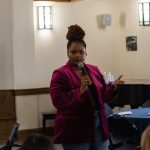BRENDAN HORAN ’21
CONTRIBUTING WRITER
On the morning of Wednesday, Oct. 17th, Trinity College hosted the Connecticut Supreme Court as part of the Court’s On Circuit program. Since 1986, the On Circuit program has allowed oral arguments to be held at various schools and universities in the State of Connecticut, to allow the general public, particularly students, to get an up-close look at the State’s appellate system.
Last Wednesday’s hearing was of special significance because two Trinity alumni were present as members of the court: Associate Justice Richard N. Palmer and Senior Associate Justice Christine S. Vertefeuille. Both graduated in 1972. Justice Palmer sat on both panels, whereas Justice Vertefeuille sat on the latter one. Some students interested in the law also had the opportunity to meet with the justices over breakfast prior to the hearings, where the justices discussed the legal profession and their jurisprudential approaches.
Prior to Wednesday’s hearings, Chief Justice Richard A. Robinson had stated in a press release from the Connecticut Judicial Branch that “The Supreme Court is very much looking forward to hearing arguments at Trinity College, and we are thrilled that Justice Palmer and Justice Vertefeuille will be part of the visit to their alma mater. Trinity has been a gracious and welcoming host, and we thank everyone who has been involved with the planning, including staff and volunteer attorneys who have familiarized the students with the cases and appellate process.” In the same press release, Trinity College President and Professor of Neuroscience Joanne Berger-Sweeney stated that, “It is an honor for our campus community to host the ‘On Circuit’ program at Trinity.” Berger-Sweeney continued, noting that she is “proud to count distinguished Justices Palmer and Vertefeuille among our alumni, and I thank them for the tremendous example they set for our students every day.”
The first case of the day involved an appeal of a murder conviction, State of Connecticut v. Jean Jacques, and began at 10:00 a.m. The Defendant, Jacques, had previously been found guilty of a 2015 murder in Norwich by a lower court. However, the key evidence in the case, a bag of drugs and a cell phone belonging to the victim, had been found in the Defendant’s apartment by police who did not have a search warrant. The State argued that because the Defendant’s lease had run out and the landlord allowed the search, he had no reasonable expectation of privacy. The state attorney, David Smith, argued that the Defendant had not demonstrated an intent to pay the next month’s rent, and had therefore abandoned the property.
Meanwhile, the defense attorney, Max Simmons, contended that the state had provided no evidence that the Defendant had intended to abandon the apartment. He said that the warrantless search was therefore a violation of the 4th Amendment.
Much of the questioning by the justices concerned technicalities of Connecticut housing law, specifically the question of what constitutes legal “abandonment,” an area in which both attorneys admitted to having limited knowledge. The panel of justices grilled both attorneys, repeatedly asking tough questions to poke holes in their respective arguments, such as noting that parolees, such as the Defendant at the time, have a lesser expectation of privacy than others under the 4th Amendment. Each attorney had 30 minutes to make an oral argument and answer questions from the judges, after which a question-and-answer period was held with the audience, where students asked many questions concerning the housing law and 4th Amendment protections.
The second case, Austin Haughwout v. Laura Tordenti, began shortly after 11:30 a.m. This was a civil case concerning freedom of speech. The Plaintiff, Haughwout, was expelled from Central Connecticut State University after a series of statements and actions that were perceived as threatening. These include, but are not limited to, bragging about bringing a gun to school, mentioning that he had bullets in his car, wondering aloud how many bullets he would need to shoot up the school, and stating that “someone should really shoot up the school.” A trial court found that the Plaintiff failed to prove that his free speech was violated. Wednesday’s arguments focused on whether the Plaintiff’s words and actions constituted a “true threat” under the First Amendment. Defense attorney Mario Cerame opened by arguing that his client did not make these statements, but acknowledged that for the sake of argument, assuming they were said, that they did not constitute a “true threat.” The justices rebuked this argument, noting that the record before them reflects that Haughwout did make the statements. The State, represented by Ralph Urban, conversely argued that these statements constituted a “true threat” and should be considered in their “totality.”
Several justices questioned the State regarding how to review the incidents, specifically whether they be viewed individually or taken in their totality. Several justices also questioned the extent to which speech can be allowed, notably Justice Ecker, who raised concern regarding the targeting of individual students, noting that certain limits must exist considering the context of a school, where students both work and live. This argument was again followed by a question-and-answer, where students continued the discussion of the extent of free speech. If the trial court’s ruling is overturned, the plaintiff may be allowed to re-enroll at Central Connecticut State University.
The hearings were proceeded by informed discussion in Public Policy and Law and Political Science classes about the cases under review. The Court was brought to Trinity through the efforts of the Public Policy and Law Department, Political Science Department, Trinity College Pre-Law Society, and the Trinity Mock Trial Team and the Court was originally invited in the spring via a letter authored by Brendan Clark ‘21, a Public Policy and Law and History Major.
Both cases will be available for review, once decided, on the Court’s website at http://www.jud.ct.gov/.





+ There are no comments
Add yours